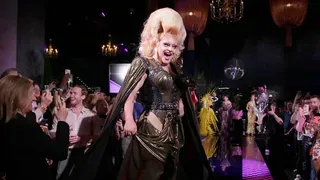May 11, 2011
Armistead Maupin - A Tale Of A New City
Kevin Mark Kline READ TIME: 5 MIN.
The musical adaptation of Armistead Maupin's Tales of the City is like d�j� vu all over again for the San Francisco-based little engine (or in this case, cable car) that could-and did-make it over the hill and around the literary bend. It is still on track in its 37-year nonstop journey, entertaining people's lives the world over with no signs of slowing down.
In a nutshell, the progression of the original Tales of the City began with its release as a five-week chapter serial in the defunct Pacific Sun in 1974. It then ran as a daily serial in the San Francisco Chronicle for a year and then beyond that with subsequent Tales (the fifth installment ran in The Examiner) circa 1976. A book was spawned in 1978, eventually becoming a series of eight, including the most recent volume Mary Ann in Autumn, which was released last year.
In 1993, Hollywood came-a-callin' by way of Britain's Channel 4, creating a miniseries starring Olympia Dukakis, Bill Campbell and Laura Linney, which later aired on PBS in 1994 to rave reviews, then receiving the esteemed Peabody Award. Showtime picked up the reigns, after that and aired More Tales of the City and Further Tales of the City in 1998 and 2001, respectively. Phew, that's a pretty big nutshell!
Maupin, the man behind 28 Barbary Lane (and its key residents, Mary Ann Singleton, Michael "Mouse" Tolliver and Anna Madrigal to name but a scant few who have walked up the rickety steps of its safe haven) was awaiting the curtain rise on the musical adaptation when he spoke to The Rage Monthly, which was just five weeks shy of its world debut at The American Conservatory Theater in San Francisco. It opens on May 18 and runs through June 10.
The down-to-earth and friendly author clued us in on what it's like to watch his literary child as it is sent off to a new school, placed in the capable hands of the Tony Award-winning duo behind Avenue Q and Scissor Sisters members Jake Shears and John Garden while it graduates to the musical stage.
How did you find out that the first and second novels were being adapted into a musical?What was your initial knee-jerk reaction to that?
My initial reaction was one of great excitement, because the guy who was asking permission to do it was somebody that already earned my respect. Jeff Whitty wrote the book to Avenue Q, and I was completely captivated by that show when I saw it in New York.
Jeff had been traveling to London on a red eye flight to open the London production of Avenue Q, when he watched the miniseries of Tales of the City for the first time on his laptop. He read the novels himself years before; watching the miniseries made it easier to envision it as a musical. So he wrote and asked me if that might be a possibility, and I told him we should get together and talk.
You had previously said, and rightfully so, that you are not a "control freak" when it comes to lending a hand with the creative process on film/TV projects based on your work-was it difficult to hand over the reigns on a musical adaptation?
No, and not if I trust the artist whom I'm working with. If I feel that someone hasn't got the chops, I'm likely to step in and say something about it. There are some remarkably talented people who are working on this musical, and they've brought ideas to it that have actually improved the material, and sharpened the story. It's about someone understanding the material so well, that they can solve problems that come up in the course of creating the musical-it's a different art form entirely.
What Jeff Whitty, the librettist, Jason Moore, the director, Jake Shears and John Garden, the composer/lyricists did, was find ways to make the story work on stage. In doing so, they eliminated some story lines, weaving in other storylines from the second novel, which created more of a sense of unity.
Years ago Christopher Isherwood, the author of The Berlin Stories, who was a sort of friend and mentor, told me that he thought Tales of the City and More Tales of the City should've been one big novel. This, in essence, is what they've done.
It sounds like the show has all of the makings a hit-are there any plans to possibly have this version of Tales become a silver screen musical ala Hairspray-or is that putting the cart before the horse?
It has to succeed on the stage first (laughs). Of course I have fantasies, some of which include it moving beyond this non-profit theater company to a theater elsewhere. We try to make this the best that we could make it at this point and go from there.
To be honest with you, I have a very good instinct about it. But I'm not really capable of judging these things. So all I'm riding on is the high hopes and belief in the artists who are creating it-and we're having fun, that's always a good sign! The people involved with it are all very excited, and the cast is completely revved.
This is a three-parter: Since we are getting closer to the curtain raising on a brand new Tales experience, have you seen the show in its entirety? What do you think of its cast, and what experience will fans come away with in seeing this new incarnation?
Well, I've seen workshop versions of it, but it's a fluid entity right now, so it's always changing. I will see sets and costumes for the first time next Monday and I'm really excited about that! Sometime, in the next few weeks, I'll see a run through of the way it is in its current incarnation. Well, the cast members are all Broadway veterans; that's quite a boon to what is fundamentally a production for a non-profit regional theater. We've attracted a lot of great talent, and I'm very happy about it.
Oh I hope they'll feel moved and exhilarated, and all of the usual things that you want a musical to do (laughs). I think a lot of its themes having to do with coming out and being yourself (fighting the narrow minds of the world) are still as relevant now as they were 35 years ago.
We have a moment with Anita Bryant in this musical that is no different from anything Michele
Bachmann and Sarah Palin are saying. I think we're hearing a louder noise from the religious radical right because they know they're losing the battle. Puritans almost never win out in America, we've had them from the very beginning. They were the ones burning witches, after all. It's a very un-American thing, in the end, to try to tell people how to live. The trick is to fight consistency in your own attitude about yourself, and not worry too much about
what the tides are. Life shouldn't be run by opposing poles.
To purchase tickets for Armistead Maupin's Tales of the City: A New Musical, log onto act-sf.org. For a new social networking experience, check out his husband Christopher Turner's new website, bearcentral.com.







